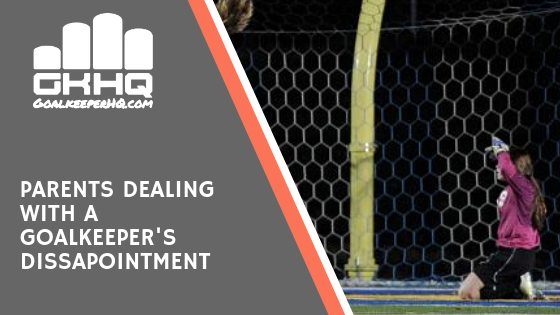My last article on dealing with disappointment was aimed at the goalkeepers themselves, but here is a post specifically for parents on helping their son or daughter deal with disappointment. The disappointment may be a little broader than just the result, which is what I focused on during the last article.
Firstly I would like to share my very popular post on how to be a good goalkeeping parent.
Disappointment can actually be a good thing — especially when you, as a parent or coach can teach them how to bounce back.
The fact is, life is full of disappointment and if through the game of soccer, it provides life lessons on how to deal with it then bring it on.
I have been amazed at the lengths goalkeeping parents go to to protect their son or daughter from the valuable lessons that goalkeeping disappointment may bring. Here are two examples; 1) Only playing for teams that win all the time 2) Taking players away from a club when their goalkeeper’s playing time is threatened by a second goalkeeper.
The following exert was taken from NBC Basketball Camps.
Watching your children in pain is so challenging. It is harder on you than it is on them. Don’t make it worse by living below the line through rage, back-stabbing the coach, talking negative about the program or other players, and filling the home with bitterness. Your words can be an even heavier burden. Disappointment is a fact of life but bitterness, shame, and rage do not have to be. Work to help your son or daughter become a more powerful, healthy and mentally tough person.
- Be in control over where and with whom you share your feelings. Immediately after the game is not a time for reactive, hostile, or bitter behavior. Venting in public, bad mouthing the coach, acting like you don’t care are poor ways to handle disappointment. Not only do you come across as a bad loser, but you will also be an embarrassment for your son or daughter who will already be dealing with numerous emotions.
- Empathize, Empathize, Empathize! Though it’s tempting to rush in and reassure or correct your child’s thoughts and feelings (by saying, don’t feel that way, don’t say that, that’s not true!), this will only make kids get more upset because rightfully so, they feel you haven’t heard them. Instead reflect what they are saying, “this feels like the worst day of your life,” or, “you feel like you’re the worst player.” Empathizing doesn’t mean agreeing with their conclusions, it means accepting that this is your child’s state at this moment. By hearing his or her thoughts played back, children are often able to move beyond the feelings and recognize how they are different from the facts, “I feel that way, but I know it’s not true.”
- Lower the stakes, not the standards: Separate your child’s value from the outcome of the game. Your child’s value as a human being isn’t at stake every time he or she steps on the field (it only feels that way to them) Don’t dispense with the importance of playing well, but dispense with the inaccurate interpretation of what it means to lose: ask your child what it means to him or her if he loses, and then ask them to think what it really means in life. What is the interpretation that the coach has? The other players? The outcome of the game is temporary and changeable, your value is permanent and only will improve with effort.
- Separate the feelings from the facts and ditch the absolutes: When we’re upset our feelings are extreme, fortunately, the facts are not. Best way to point this out is to simply reflect back what your child says and remind them that feelings are strong at first, but they pass; they don’t last forever. So, if your child says: “Everyone is better!” you say, “It feels like everyone is better than you—is that what you really think is true, or just how you are feeling right now?” Listen and help your child correct the absolutes: “everyone is better” becomes “some people play better, some don’t”, “I never do anything right,” becomes, “I usually play well, this was a tough game.” “I stink at everything” becomes I am strong in shot stopping, I need to practice my kicking more.
- Identify where your child is on the learning curve: Ask your child how long they have been playing the position. Think through with your child about how long it will take to learn a new skill and how they will know when they have mastered it. Be aware of all the core competencies that goalkeepers need and ask the goalkeeper to evaluate themselves on each to get an idea of where the work needs to start.
The Goalkeeper HQ learning cycle helps players in each area of the game.

Read and watch more about the coaching cycle and how goalkeepers can put it into practice through the Goalkeeper HQ Members Area.
